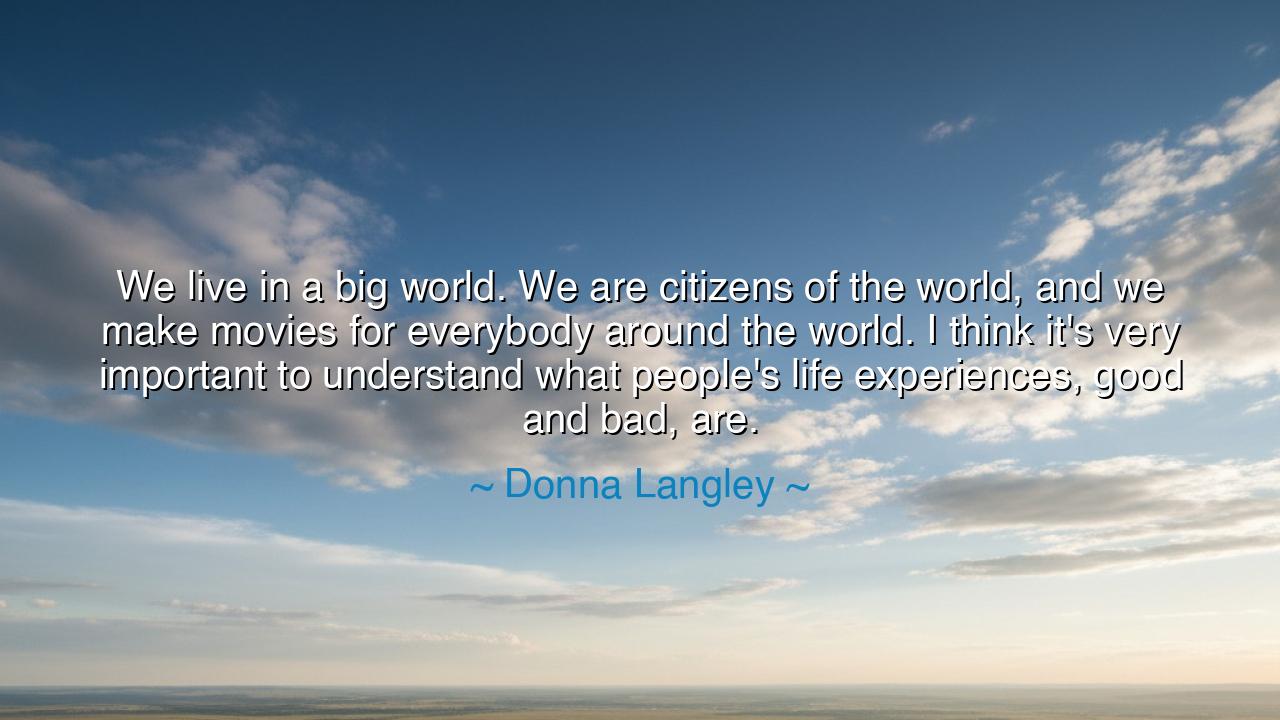
We live in a big world. We are citizens of the world, and we
We live in a big world. We are citizens of the world, and we make movies for everybody around the world. I think it's very important to understand what people's life experiences, good and bad, are.






Donna Langley’s words, "We live in a big world. We are citizens of the world, and we make movies for everybody around the world. I think it's very important to understand what people's life experiences, good and bad, are," speak to the profound responsibility that we all share as global citizens. Langley reminds us that the world is vast and interconnected, and through the art of storytelling, particularly film, we are tasked with understanding and reflecting the diversity of human experiences, both the triumphs and the tragedies. Movies, as a powerful form of communication, are not just meant to entertain, but to offer insight into the lives of people across cultures, backgrounds, and circumstances, so that we may better understand and empathize with each other.
In the ancient world, great leaders and philosophers were often tasked with understanding not only their own people but the people of distant lands. Alexander the Great, when he sought to conquer vast territories, didn’t just fight battles—he also sought to understand the cultures he encountered. He appreciated the beauty of Persian art, the wisdom of the Egyptians, and the philosophical depth of Indian sages. Alexander’s journeys were not just about physical conquest, but also about expanding his understanding of the diverse experiences of the world. He recognized that true leadership, and true strength, lies in the ability to understand and connect with people from all walks of life. Like him, Langley speaks of the power of storytelling to unite, to teach, and to expand our understanding of the world.
Consider the stories of the ancient traders, who traversed vast distances to bring goods, ideas, and cultures to faraway lands. These travelers, though primarily focused on commerce, were also emissaries of cultural exchange. They carried not only spices and silk but stories, legends, and traditions that enriched the societies they touched. Much like the role of film today, these ancient stories were a means of connecting disparate peoples, giving each culture a glimpse into the lives and struggles of others. Langley’s message is a continuation of this ancient tradition, where stories—whether on the silver screen or through other means—serve as a bridge that connects humanity, helping us to see beyond our own limited perspective and appreciate the complexity of the human condition.
Langley’s emphasis on understanding people’s life experiences, good and bad, echoes the ancient belief in the importance of empathy. Consider the Greek philosopher Aristotle, who believed that true ethics and morality could be achieved only by understanding the experiences and emotions of others. He argued that we must not judge people based on preconceived notions or superficial differences but based on their shared humanity. This principle of empathy, which has been a cornerstone of human wisdom for centuries, underscores Langley’s point about the importance of understanding the lives of others, especially when we are telling their stories. The more we immerse ourselves in the experiences of others, the more capable we become of sharing stories that are authentic and meaningful.
This insight is not merely a philosophical one—it has practical applications for the world today. Film, like the great works of literature and philosophy, shapes the way we see the world. It has the power to reshape perceptions, challenge biases, and open doors to new understandings. Think of Steven Spielberg’s Schindler’s List, a film that not only tells the harrowing tale of the Holocaust but also illuminates the human capacity for both cruelty and compassion. Spielberg did not merely create a film; he created a bridge that allowed the audience to experience the pain and suffering of the past, but also the redemption and hope that came with acts of kindness. Langley’s belief that movies are for everybody around the world is rooted in this power to connect, to help us see the world not just as we know it, but as others live it.
The lesson here is simple but profound: in a world that is both vast and diverse, we must seek to understand the experiences of others, both their joys and sorrows. We must strive to be not only creators of art but also empathic observers of life itself. Just as movies can serve as windows into the lives of others, so too must we seek out the stories and perspectives that will deepen our understanding of the world. Do not settle for the narrow view—go beyond your own experience, and immerse yourself in the richness of what others have lived, so that you may share their journey.
In your own life, make it a point to seek out the diverse experiences of those around you. Read the stories of others, travel to places that are unfamiliar, and engage with people whose backgrounds and beliefs may differ from your own. Embrace the lessons they offer, and let these lessons shape your understanding of the world. Just as film has the power to connect us all, so too can you. By seeking understanding, you not only expand your own horizon but contribute to the greater story of humanity, helping to build a world that values and cherishes the diverse experiences of all its people. Live with open eyes, and let the richness of the world’s experiences shape who you are.






AAdministratorAdministrator
Welcome, honored guests. Please leave a comment, we will respond soon